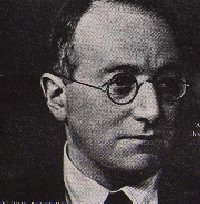|

R. G. Collingwood

Hayden White
|
The distinctly modern awareness that our knowledge
of the past is in fact inseparable from our ever developing knowledge of
ourselves and about the world, the realization that there may in fact be
a "meta" dimension to historical study, the new knowledge that history
is not just a neutral playing field but the ground out of which human consciousness
has sprung--these have produced an increasing self-consciousness, an historicism,
governing the writing of history in this century, whether the author be
R.
G. Collingwood or Hayden White.1
"We have witnessed the dim dawning of a sense that history is to be grasped
as something substantial, as something essential to the being of man, as
an 'existential encounter,'" Barfield writes in "The Son of God and the
Son of Man."
The phenomenon has been called "historicism,"
and it has been called "historicity"; the Germans call it "Historismus."
It was R. G. Collingwood who remarked that
this historicism can almost be regarded as a revolution. He compared it
to the sudden awakening of interest in natural phenomena which occurred
at the time of the Scientific Revolution in the seventeenth century. (RM
255)
As a philologist, Barfield is anxious to remind
that our historicism must not neglect--as it tends to do--the place of
language in our understanding of history:
As to the history of language, it
had always seemed to him to be the key to history itself. He recalled the
late birth . . . of his own interest in history, which at school had somehow
passed him by. It was a different matter altogether when you saw that history
was still immanent, still present in so many words in everyday use. Incidentally
it had always seemed to him that this was where Oswald
Spengler had gone astray. His picture of a series of successive civilizations
each starting afresh from scratch left out the seed-corn of language. (UV
70)2
| See in particular
History, Guilt
and Habit, passim, "The Son of God and the Son of Man" (RM
249-61). |
1In
History
in English Words, Barfield offers the following capsule summary of
the growth of historicism.
The Greek 'historia' could mean practically any kind of knowledge;
in the same way, when 'periodos' (literally 'way round') was used of time,
it means a cycle, one of a recurring series; it was not till the eighteenth
century that a period of history acquired its modern sense of an indefinite
portion cut from a continuous process. Labels like Middle Ages, Renaissance,
. . . are none of them earlier than the eighteenth century, which also
saw the new expressions develop and development, and the fact that the
significant words anachronism, evolution, and prehistoric, with the new
perspective they denote, only appeared during the nineteenth century may
make us doubtful whether the mists of time have even yet fallen wholly
from our eyes. (162).
|
| 2Language plays
an especially important role in our investigation of prehistory. "If we
wish to cross the darkness which separates us from [prehistory]," Barfield
observes, "we must lay down a little plank of words and step delicately
over it" (HEW 19). |
|

